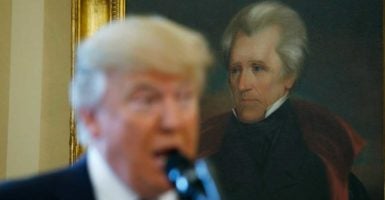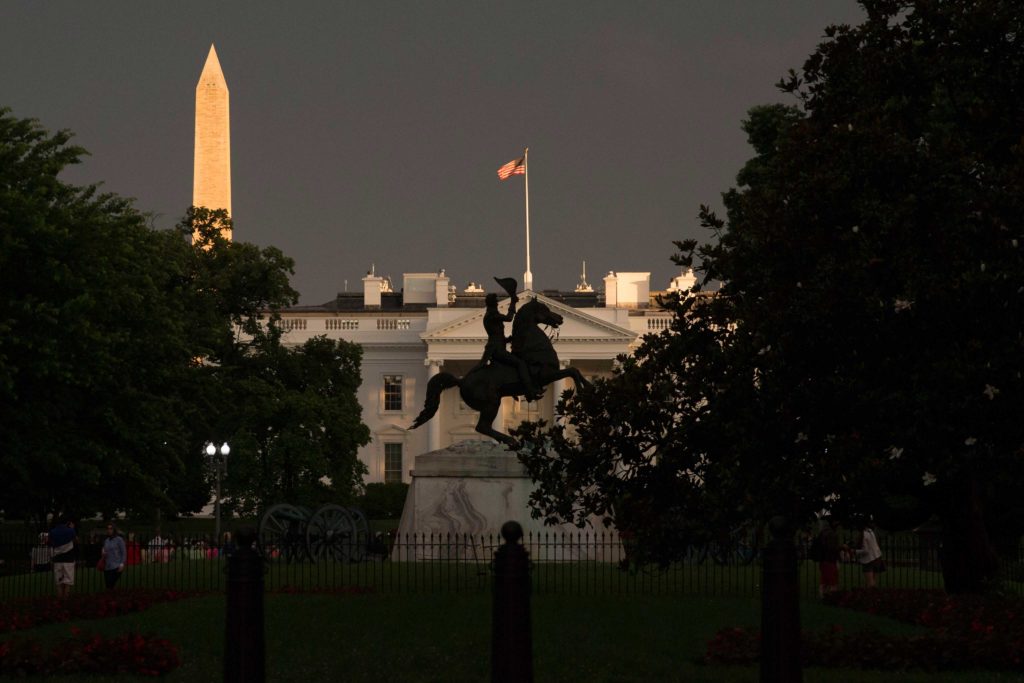Andrew Jackson is back in the White House—or at least his portrait is.
Following President Donald Trump’s inaugural address, his chief strategist, Steve Bannon, noted that the speech was modeled after Jackson’s and that it contained the “basic principles of [Trump’s] populist and nationalist movement.”
Trump’s speech to a joint session of Congress on Tuesday will likely hit similar Jacksonian themes of helping the “forgotten men and women” who are watching the American dream slip away.
During the presidential election, there were numerous comparisons between the seventh president and Trump. His top advisers have certainly cultivated the image. This has provoked a response from Trump’s detractors who are now using a distorted narrative of Jackson’s legacy as a cudgel against the new president.
A recent C-SPAN annual survey of greatest presidents knocked Jackson down from 13th to 18th. This is an unsurprising development given the strong liberal bent of college professors.
>>>Here’s How America’s First Outsider President Set a Precedent for Inaugurations
But Jackson never really did appeal much to the elite in his day, and Trump clearly doesn’t care to in ours.
Though Trump has a long way to go before he can replicate the success of Old Hickory, as Jackson was often called in his day, this doesn’t mean he can’t be an effective president or widely appeal to the American people rather than a tiny subsect of historians.
Jackson turned his heroism and celebrity, earned through an almost miraculous victory at the Battle of New Orleans, into a successful White House bid.
As it is today, populist discontent was surging in Jackson’s era, but the hero of New Orleans was no mere rabble-rouser. He directed populist discontent toward limited government and the principles laid down by the Founding Fathers.
If Trump wants to succeed in making America great again while channeling Jackson, he will need to focus on these critical Jacksonian ideas.
Throwing Out Entrenched Bureaucrats
One of the central themes of Jackson’s election was that a permanent political class had rooted itself in Washington and needed to be expunged. Many bureaucrats had spent their entire careers in Washington despite, in many cases, incompetence, corruption, and general uselessness.
Jackson believed that too many so-called public servants saw their office as untouchable property, and that while most Americans toiled through economic downturns and the challenges of the private sector, those in the federal city enjoyed unbroken prosperity at the expense of taxpayer largesse.
In response, Jackson wrote perhaps the best defense of “rotation in office” for government employees during his first annual message to Congress. In this 1829 speech, Jackson pushed Congress to adhere to “term limits” for bureaucrats—containing their time in office to four years, after which they would have to apply for their job again.
Jackson said,
The proposed limitation would destroy the idea of property now so generally connected with official station, and although individual distress may be sometimes produced, it would, by promoting that rotation which constitutes a leading principle in the republican creed, give healthful action to the system.
However, most bureaucrats today can’t be removed from office due to the Pendleton Civil Service Reform Act passed in the late 19th century.
Though it was initially adopted to curtail the “spoils system” of political hiring, the modern civil service system locks in 90 percent of employees into positions for life: exactly the kind of “property” in official station Jackson warned about.
>>>Andrew Jackson Portrait Now Hangs in Oval Office. Here’s What He Said About Draining the Swamp.
Trump has learned firsthand how the unelected and unaccountable fourth branch of government can impede the agenda of a duly elected president. Agencies fighting to undermine an administration should worry anyone who believes in republicanism and rule by the people.
As Trump said in his inaugural address, “What truly matters is not which party controls our government, but whether our government is controlled by the people.”
If Trump wants to uphold his “you’re fired” catchphrase, he needs to push for serious civil service reform to break up this now unrestrained administrative state. There is simply no larger threat to constitutional government. It must be dealt with immediately.
Opportunity for All, Favoritism to None
Trump mentioned in his inaugural address that “the forgotten men and women of our country will be forgotten no longer.”
Jacksonians certainly wanted to lift the forgotten man, not with a handout or a government-protected business, but with an equal playing field.
Above all, they detested crony capitalism. This is the sordid collusion between big business and big government working together to squeeze out the common man, who doesn’t have prominent connections or well-paid lobbyists in the halls of power.
When Jackson vetoed the re-charter of the Second Bank of the United States—which had many politicians practically on its payroll—he crafted one of the most elegant attacks on crony capitalism ever written while committing to one of the strongest Jacksonian ideas: opportunity for all, favoritism to none.
>>>The Media Have It Wrong: Andrew Jackson’s Legacy Was Fighting Crony Capitalism
Jackson wrote in his veto message:
It is to be regretted that the rich and powerful too often bend the acts of government to their selfish purposes … When the laws undertake to add to these natural and just advantages artificial distinctions … the humble members of society—the farmers, mechanics, and laborers—who have neither the time nor the means of securing like favors to themselves, have a right to complain of the injustice of their government.
The idea that the American government is being squeezed to serve a few elites at the top rather than Americans in general is perhaps one of the strongest similarities between Jackson’s era and our own.
Allowing this corrupt system to continue will undermine the people’s confidence in their government and erode the belief that anyone has a chance to achieve the American dream in this country without needing special favors from powerful insiders.
Government deals cut with companies may benefit a few people immediately, but the consequence in the long run will be to continue granting unfair advantages to those with the ear of the powerful in Washington, D.C.
Trump’s attitude toward crony capitalism remains unclear, though he would be wise to follow Jackson’s lead and restore American faith in the justice of our institutions.
Negotiating the Best Trade Deals
Using government to cripple Americans’ ability to trade goods and services with the outside world will ultimately hurt the American people, and result in the choosing of winners and losers among American companies.
Yet Trump, who has said that he’s for free trade—as long as it’s “fair trade”—could benefit the national and individual interests of Americans by using his strong rhetoric to secure the best deals.
Some commentators have pointed to Jackson’s early 1820s statement on trade in order to paint him as a committed tariff man.
However, while Jackson the candidate was sincere in his belief that American industry needed moderate protective tariffs to grow, Jackson the president came to conclude that tariff proponents wildly overestimated its benefits to the American worker.
Jackson distrusted the power of government to create prosperity for the American people. He concluded that protective tariffs—like all crony capitalist deals made for one industry or group of Americans at the expense of others—ultimately helped Washington-connected big businesses more than the average American.
In fact, Jackson ended up securing more free trade agreements than any president up until that time, because he understood that attempts to help the “American economy” as a unit frequently end up choosing one set of American businesses—usually those without the budget for Washington lobbyists—over another.
Jacksonian economics depended on returning power to the states and the people, rolling back an unfair system in which government picks economic winners and losers, and truly unleashing the power of the “forgotten man” to write his own economic destiny—to succeed or flounder without the interference of an incompetent and overbearing government.
Peace Through Strength
Trump’s inaugural address, speeches, and statements have hit Jacksonian foreign policy themes—well-described by political scientist Walter Russell Mead as opposed to Wilsonian internationalism and nation-building as favored by most elites, yet also not opposed to waging large-scale war when the community is in danger.
Issues like border enforcement and destroying radical Islam are certainly important factors in making Americans safe again.
Jackson did not advocate wildly spending money on national defense, but was a proponent of selectively strengthening the military tools most needed to counteract threats to the American people. For instance, in his farewell address, Jackson advocated bolstering the Navy, which he enlarged and modernized during his presidency.
As 19th-century writer Joseph C. Hart noted, “Supremacy on the ocean is America’s great national destiny.”
Jackson understood this in his own way, and the Trump administration clearly understands that American prosperity depends on dominance of the high seas.
Trump committed to rebuilding the Navy during the campaign, which will be vital to counter major national threats in the South China Sea and elsewhere. America’s power in the 21st century depends on keeping sea lanes and trade open.
Powerful adversaries, like China, will attempt to squelch this as much as they can, which is why a reinvigorated Navy is vital for American prosperity.
Trump, like Jackson, understands that the military needs to be rebuilt to better respond to vital national interests in the 21st century. A good guide to this is The Heritage Foundation’s Index of U.S. Military Strength, which focuses on key areas that the administration should work on in the next few years.
As Jackson said, “We shall more certainly preserve the peace when it is well understood that we are prepared for war.”

Andrew Jackson became an instant national celebrity after winning the Battle of New Orleans. This victory propelled him to the presidency. (Photo: World History Archive/Newscom)
Nationalist, but Federalist
There has been an increased focus on defining “nationalism” in the age of Trump as many credit the rise in this sentiment to the election of Trump and other leaders across the globe.
Historian Daniel Feller once said that Jackson was “as ardent a nationalist as anyone in the country.”
Nevertheless, Jackson understood that for America to be strong, its federal government must be circumscribed to what it does best: keeping Americans safe from international threats and focusing on projects of only a national scope.
Jackson’s nationalism was firmly grounded in the patriotic attachment to both the young history of the American people as well as the timeless ideas of limited government and republicanism that were present at its creation. America has a special destiny, and he was going to help carry it out.
Nationalism veers off course when it sees the federal government as the chief vehicle for the greatness of the people, more in line with Franklin Delano Roosevelt’s New Deal projects than with Jackson’s devolution of power to the states and people.
Unlike Jacksonian patriotism, this form of economic nationalism weakens the Constitution and federalist system that are America’s unique institutional inheritance.
Though Jackson believed in some government role in building infrastructure, he thought it was best done at the state level. His famous Maysville Road veto rejected a Kentucky-based project because he said Americans were “losing sight of the distinctions between [projects of a] national and local character.”
In fact, Jackson veered from some of the economic nationalism of his predecessor, John Quincy Adams, who believed that national progress needed to be guided by enlightened leaders in the federal government.
In modern times, the Export-Import bank, which finances foreign countries so that they may buy American goods, can be justified under a generally protectionist and nationalist regime as helping American companies close the trade deficit.
But this New Deal-era program, which has come under attack from the Jacksonian Tea Party, mostly enriches a few large businesses at the public’s expense rather than serving the American people. There is a vastly better way to help the American worker.
The Jacksonians had faith that the American people would rise to the top if government would just get off their backs—that, as Ronald Reagan announced in his first inaugural address, “government is not the solution to our problem, government is the problem.”
Trump and his advisers have suggested that the administration will focus on rebuilding infrastructure, but they should weigh, like Jackson, what policies have a national scope and which should be left to states and localities.
Americans don’t want to be left with another expensive federal slush fund, as was the case with President Barack Obama’s massive stimulus package.
>>> A Look Back: 7 Instances of Wasteful Spending in the Stimulus Package
Some projects are indeed national in scope, such as finding better ways to use and control the nuclear waste at Yucca Mountain.
However, Trump should focus on more truly Jacksonian ideas like his recent overturning of Obama-era coal mining regulations and repairing infrastructure by moving its control away from the federal government. This is the path to truly helping the American worker.
Ultimately, the set of Jacksonian ideas described above makes Americans feel safe and confident in an unsettled world, takes a hatchet to cronyism that undermines American faith in the free-market system, and restores the limits on state power that has created a bloated and corrupt ruling class in the nation’s capital. This will ultimately quiet the storm of populism.
These principles comprise the true spirit of Jacksonianism. If Trump follows this course, he will truly be fulfilling the promise of his inaugural speech: restoring power from an elite class in Washington to the people, to whom the Founders bequeathed it.
If he merely mouths Jacksonian platitudes rather than Jacksonian substance, he will learn that American (and world) history is replete with examples of populist promise turned sour.
































